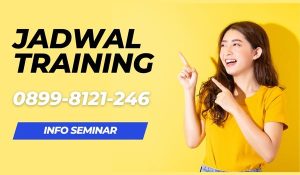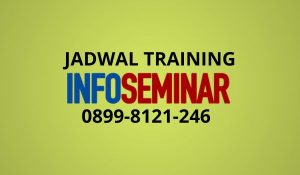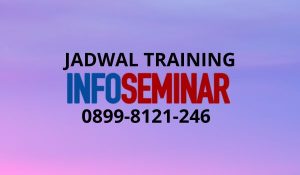Production Operation Management For Managers
Tanggal
15 – 18 Juli 2014
26 – 29 Agustus 2014
22 – 25 September 2014
27 – 30 Oktober 2014
24 – 27 November 2014
16 – 19 Desember 2014
Jam Pelaksanaan
09.00 – 16.00 WIB
Tempat
Hotel Kagum Group Bandung (Golden Flower, Banana Inn, Grand Seriti, Carrcadin, Amaroossa, Grand Serela, Gino Feruci, Verona Palace, Malaka, Zodiac Taurus)
Pembicara / Fasilitator
Dr.Ir. Sudjati Rachmat, DEA. adalah dosen di jurusan perminyakan ITB sejak tahun 1979 sampai sekarang. Beliau alumnus dari ITB lulus tahun 1977, kemudian melanjutkan pendidikannya di Diplome d’Etude Approfondie Ecole Centrale de Lyon, UCB Lyon I, FRANCE. Dan pada tahun 1985 – 1987 beliau mengambil program Docteur en Mecanique de Fluide (Methode Numerique) Ecole Centrale de Lyon, UCB Lyon I, FRANCE.
Dr. Sudjati Rachmat sering menjadi instruktur dalam banyak pelatihan yang berkaitan dengan perminyakan untuk perusahaan di seluruh Indonesia, diantaranya seperti Pertamina, Chevron, Badak LNG, Total, Vico, Mobil Oil Indonesia, Ministery of Mining and Energy, Unocal Indonesia, Lemigas, IATMI-IWPL Migas, PPTM Migas, PT Caltex Pacific Indonesia, Gulf, Arco, dll.
Topik-topik training yang Beliau sampaikan diantaranya adalah production surface and down hole equipment, Basic Reservoir Engineering, Sucker Rod Pumping Theory and Practice, Production Logging Engineering, Nodal Analysis and Production Optimization, Well Test, Operation and Interpretation, Well Design, Completion and Workover, Numerical and Statistical Method for Petroleum Engineering Problems, Oil-Well Stimulation, Hydraulic Fracturing, Statistics for Petroleum Engineering, Reservoir Simulation for Enhanced Oil Recovery, Applied Reservoir Engineering and Reservoir Simulation, Aspects of Horizontal Well Technology, Geology and Geophysics Modeling, Advanced Programming on Numerical Analysis and Industrial Information System, Management Information System, Well Stimulation of Oil and Gas Reservoir, Horizontal Well Technology, Transportation of Oil and Gas, Sand Control Technology, dan lain-lain.
Beliau banyak melakukan penelitian di bidang MIGAS dan telah mempublikasikan dan menseminarkannya di forum dunia.
Harga
- Rp 8.750.000/person (full fare) or
- Rp 8.500.000/person (early bird, payment 1 week before training) or
- Rp 8.250.000/person (if there are 3 or more participants from the same company)
FASILITAS UNTUK PESERTA :
- Modul Training
- Flash Disk berisi materi training
- Sertifikat
- ATK: NoteBook dan Ballpoint
- T-Shirt
- Tas
- Foto Training
- Ruang Training dengan fasilitas Full AC dan multimedia
- Makan siang dan 2 kali coffeebreak
- Instruktur yang Qualified
- Transportasi untuk peserta dari hotel penginapan ke hotel tempat training – PP (jika peserta minimal dari satu perusahaan ada 4 peserta)
What will participantS get?
After completing this course participants are expected to:
- Understanding the basic principles in performing calculations on the optimization of production operations of oil wells, gas and geothermal reservoir, the implementation of production optimization is to enhance the performance of the well and field production (Enhanced Oil Recovery).
- Conduct simple diagnosis and understand the problem solving in the oil gas well operation.
- Be able to create a simple analysis of the data of oil wells, gas and geothermal. Forecasting performance and plan the development of production operations
- Be able to conduct simple quantitative calculations from all the data acquisition, tubing, flowline, choke, perforated, gravel-packs, and subsurface safety valve in the well. Plan the development of production based on the calculation of the production capacity of each well
- Using the knowledge of production operations for solving well problems, such as: cementing, scaling, sand, corrosion and formation damage that may occur in oil and gas wells.
- Understand the basic principles of production operation’s design: cementing, workover, well stimulation with acidizing and hydraulic fracturing, and others
AUDIENCE:
No specified (Engineer or Non Engineer)
TRAINING MATERIAL OUTLINE :
1. The origin of Oil and Gas Reservoir and Geologic Considerations in producing Operation
a. Introduction
b. Sandstone Reservoirs
c. Geologic Factors Affecting Reservoir Properties in Sandstone
d. Application of Geologic concepts in Specific Sandstone
e. Carbonate Reservoirs
f. Application of Geologic Concepts in Carbonate Reservoirs
2. Exploration Method of Oil and Gas Reservoir
a. Magnetic Method
b. Gravity Method
c. Seismic Method
3. Introduction : Rotary Drilling Operations
a. Steps to drilling a well
b. Types of rigs
c. Rig Components
d. Rig Systems
4. Mud System
a. General Equations and ConceptsDiagnostic tests
b. Water based muds
c. Oil based muds
d. Additives
e. Mud handling system
5. Cementing
a. Tubing DesignFunctions of cement
b. Cement Types
c. Cement Additives
6. Oil Field Tubulars and Hydraulics
a. Drill string
b. Casing and tubing
c. Casing classification
d. Stresses on casing
e. Casing setting depth
f. Burst and collapse calculations
g. Wellheads
7. Drilling System – Pressure Loss Calculations
a. Hydrostatics
b. Buoyancy
c. Flow through pipes and annuli
d. Flow path
e. Pressure loss calculations
8. Drilling System – Bit & Nozzles
a. Hydrostatics Bit Types
b. Bit Parts
c. Bit Classification
d. Bit Nozzles
9. Introduction to Well Control
a. Hydrostatics Definitions
b. Causes of kicks
c. Kick indicators
d. Shut-in procedure
e. Well Kill Procedures
10. Directional Drilling
a. Reasons for directional wells
b. Planning Trajectory
c. Kickoff Methods
d. Survey Methods
e. Survey Calculations
f. Hole Assemblies
11. Well Completion Design
a. Factors Influencing Well Completion Design
b. Conventional Tubular Configuration
c. Unconventional Tubular Configurations
d. Sizing Production Tubular
e. Completion Interval
f. Permanent Well Completions (PWC)
g. Tubingless Completion
12. Perforating Oil and Gas Wells
a. Introduction
b. Types of Perforators
c. Evaluation of Perforator Performance
d. Factors Affecting Gun Perforating Results
e. Perforating in a Clean Fluid with Differential Pressure Into Wellbore
13. Production Logging Technology
a. Introduction
b. Logging Device
c. Application of Through-Tubing Production logging
d. Field Examples of Production Logging Techniques
e. Primary Cement Evaluation
14. Problem Well Analysis
a. Problem Wells
b. Problem Well Analysis Checklist
15. Sand Control
a. Introduction
b. Reduction of Drag Force
c. Mechanical Methods of Sand Control
d. Practical Considerations in Gravel Packing
e. Use of screen Without Gravel
f. Resin Consolidation Methods
16. Formation Damage
a. Introduction
b. Basic Causes of Damage
c. Classification of Damage Mechanisms
d. Reduced Absolute Permeability
e. Increased Fluid Viscosity (Emulsion)
f. Diagnosis of Formation Damage
17. Acidizing
a. Acid Additives
b. Carbonate Acidizing
c. Acidizing Techniques for Caronat Formations
d. Sandstone Acidizing
e. Potential Safety Hazard in Acidizing
f. Acids Used in Well Stimulation
18. Hydraulic Fracturing
a. Introduction
b. Mechanics of Fracturing
c. Production Increase from Fracturing
d. Propping the Fracture
e. Frac Fluids
f. Frac Job Design
g. Frac Job Evaluation Techniques
19. Scale Deposition Removal and Prevention
a. Introduction
b. Causes of Scale Deposition
c. Prediction and Identification of Scale
d. Scale Removal
e. Scale Prevention
20. Corrosion Control
a. The Corrosion Process
b. Detection and Measurement of Corrosion
c. Corrosion Control
21. Crude Oil and Gas Field Processing Sistem
a. Separator and Principle of Separation
b. Design of Separator
c. Sweetening Process
d. Oil and Dehydration
e. Liquid Recovery Sistem
f. Compression System
22. Principles of Measurement
a. Introduction to Measurement
b. Crude Oil Measurement
c. Gas Measurement
23. Artificial Lift Method
a. Gas Lift
b. Submersible Pump
c. Sucker Rod Pump
d. Hydraulic Pump
24. Enhanced Oil Recovery Process:
a. Classification of EOR methods
b. Description of solvent miscible processes
c. Description of chemical flood proves
d. Description of thermal recovery processes
e. Microbial and other EOR processes
f. Objectives of EOR methods
g. Types of solvents and miscibility development
h. Polymer, alkaline, surfactant and mecellr-polymer
i. In-situ combustion, cyclic steam and steam flood
j. Comparison between various EOR methods
25. Screening Guidelines and Optimization :
a. Key parameters used in reservoir screening
b. Available resources and economical considerations
c. Optimization parameters and criteria
d. Concept of incremental recovery
e. Limits on applicability of certain EOR methods
f. Typical field cases of various EOR methods








